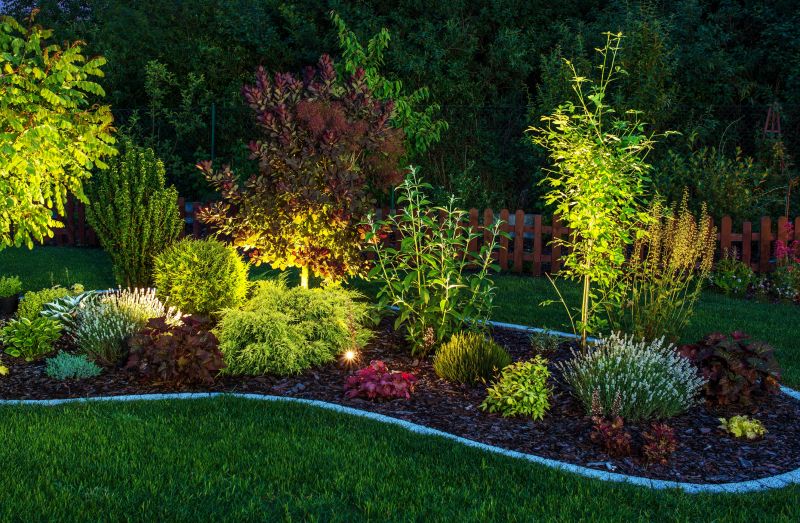Leading Products For Landscaping Curb Construction To Transform Your Landscape
Explore high-performance tools and supplies designed to streamline curb installation and enhance your outdoor environment.
 Landscaping curb installations serve both functional and aesthetic purposes in outdoor spaces. They help define borders between lawns, gardens, and pathways, providing a clean and organized appearance. Selecting the right products for curb installation can influence the durability, ease of installation, and overall visual appeal of a landscape project. From various materials to different design styles, there are numerous options to suit diverse preferences and site conditions.
Landscaping curb installations serve both functional and aesthetic purposes in outdoor spaces. They help define borders between lawns, gardens, and pathways, providing a clean and organized appearance. Selecting the right products for curb installation can influence the durability, ease of installation, and overall visual appeal of a landscape project. From various materials to different design styles, there are numerous options to suit diverse preferences and site conditions.
Top Overall Option
Versatile Landscaping Edging Material
A flexible, durable edging material that adapts to various landscape contours and styles. It is easy to install with minimal tools, making it suitable for DIY projects. Its weather-resistant properties help maintain appearance over time, providing a reliable boundary for lawns, flower beds, and pathways.
Types of Products For Landscaping Curb Installations
Concrete Curb Edging
Precast concrete options offer strength and a clean look, suitable for long-lasting boundaries.
Plastic Flexible Edging
Flexible plastic strips conform easily to curves and are simple to install, ideal for DIY projects.
Stone Edging
Natural or manufactured stone provides a rustic or elegant appearance, often used for more decorative borders.
Brick Edging
Traditional brick borders add a classic touch and are durable for various landscape styles.
Metal Edging
Steel or aluminum edging offers a sleek, modern look with strong, long-lasting properties.
Wood Edging
Timber or composite wood borders create a natural aesthetic and are suitable for informal landscapes.
Rubber Edging
Flexible rubber borders are resilient and easy to install, often used for playgrounds or soft ground areas.
Interlocking Paver Edging
Paver-style borders provide a decorative finish with the ability to create intricate patterns.
Cobblestone Edging
Cobbled stones lend a vintage or upscale appearance to garden borders and walkways.
Recycled Material Edging
Eco-conscious options made from recycled plastics or rubber offer sustainable boundary solutions.
Split-Edge Concrete Blocks
Concrete blocks with split or textured surfaces add visual interest and durability.
Bender Board Edging
Flexible plastic or composite bender boards are ideal for creating curved borders.
Galvanized Steel Edging
Galvanized steel provides rust resistance and a sleek finish, suitable for modern landscapes.
Limestone Edging
Limestone offers a natural look with subtle color variations, suitable for rustic or formal gardens.
Granite Edging
Granite borders are highly durable and lend a premium appearance to landscape boundaries.
Composite Edging
Composite materials combine durability with aesthetic versatility, often mimicking natural stone or wood.
Decorative Curb Stones
Decorative stones add artistic flair and can be used to create focal points or accents.
Popular Choices
A versatile and easy-to-install option that adapts well to curves and irregular shapes.
Precast concrete provides a sturdy and neat boundary for various landscaping needs.
Natural stone options are favored for their aesthetic appeal and durability.
Metal borders are appreciated for their sleek look and longevity in different environments.
Timber borders are popular for their natural feel and compatibility with rustic or traditional styles.
Resilient rubber borders are commonly used for soft ground areas and playgrounds.
Paver borders are used for decorative and durable boundary solutions.
Flexible plastic or composite boards are favored for creating smooth curves.
Eco-friendly options made from recycled plastics are gaining popularity.
Granite borders are chosen for their elegance and toughness.
Concrete blocks with textured or split surfaces are commonly used for functional borders.
Decorative stones are favored for adding artistic touches to landscape boundaries.
Durability and ease of installation are key considerations when choosing products for curb installations. Many options are designed to withstand weather elements and foot traffic, ensuring longevity and minimal maintenance over time. Additionally, the compatibility of materials with existing landscape features and their ability to integrate seamlessly into different design themes are important factors.
Depending on the scope and scale of the project, the type of curb material can vary widely. Some products are better suited for small residential gardens, while others are designed for large commercial landscapes. Proper planning and selection can help achieve a balanced look, ensuring that the curb complements other landscape elements while providing a sturdy boundary. Whether opting for concrete, stone, or flexible edging, understanding the specific advantages of each can aid in making an informed decision.
Ultimately, the right products for landscaping curb installations can enhance the overall appearance of outdoor spaces, creating a polished and professional look. Taking into account factors like material, style, installation method, and budget can help in choosing the most suitable options for any project. With a wide array of products available, homeowners and landscapers alike can find solutions that meet their functional needs and aesthetic preferences.
Key Buying Considerations
- Material durability and weather resistance to ensure longevity.
- Ease of installation, especially if DIY project is intended.
- Compatibility with existing landscape design and style.
- Flexibility for creating curves or straight borders.
- Maintenance requirements and long-term care.
- Aesthetic appeal and how well it complements other landscape features.
- Cost and budget considerations for the project.
- Availability of various sizes and shapes to fit specific needs.
- Resistance to pests, rot, or corrosion.
- Ease of replacement or repair if needed.
- Environmental impact of the materials used.
- Compatibility with planting beds or irrigation systems.
- Edge stability and ability to hold soil or mulch in place.
- Potential for expansion or modular assembly.
- Local regulations or restrictions related to landscape modifications.
This content contains affiliate links. We may earn a commission if you make a purchase through these links, at no additional cost to you.
